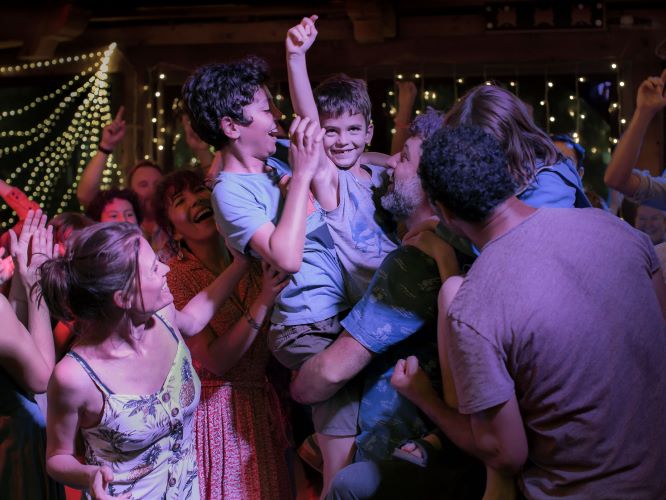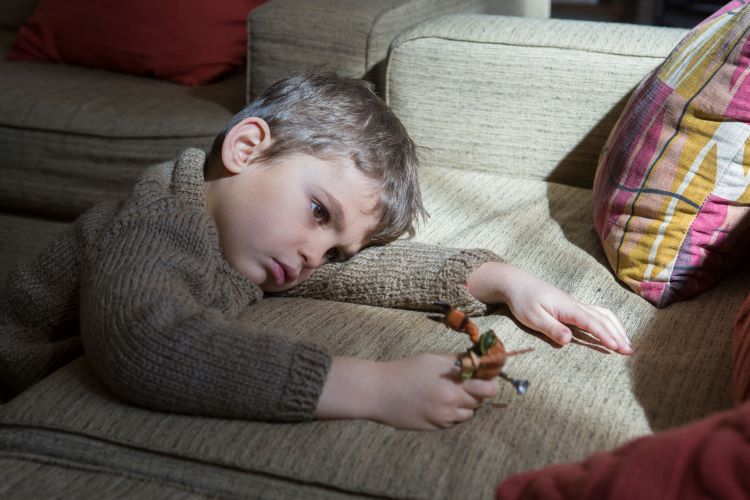
The terrain of foster care, with its joys, sorrows, and often painful truths, is explored in Fabien Gorgeart’s tender film, The Family (La Vraie Famille). There is an inevitable sadness to foster care, children never enter the care of social services for happy reasons. An issue fraught with emotion, foster care, and the dilemmas it presents, might easily sway a film into the realm of melodrama. Yet although it is very emotionally charged, its depiction of family life, and Mélanie Thierry’s restrained, and eloquent performance infuse the film with a sense of authenticity. It may bring on some tears, but it is not a tearjerker. Director Gorgeart, who also wrote the screenplay, has an intimate knowledge of his subject, as his mother worked as a foster mother for social services in France.
The film focuses on Anna (Mélanie Thierry) and Driss (Lyes Salem) who lead a happy life with their children Adrien (Idriss Laurentin-Khelifi), Jules (Basile Violette), and Simon (Gabriel Pavie). As the film opens, the family is enjoying the last sweet days of summer vacation, playing around in the swimming pool, and hanging out with friends. The soundtrack to this scene was a bit too sentimental for my taste, foreshadowing an end to carefree days, but as I stayed with the film, the sentimentality made way for a very honest contention with a complex situation. Simon came to the family as a foster child when he was just 18 months old, now six, they are effectively his family, and he calls Anna “maman”. His mother died when he was young, and his heartbroken father, Eddy (Félix Moati), was unable to properly care for his infant son. Simon has always known that Eddy is his father, and has visited him, but the relationship seems more like that of a fond, but distant, relative. Now, however, Eddy is feeling capable of caring for Simon, and is seeking to regain custody.
The essential difference between foster care and adoption is that the aim of foster care is to reunite families whenever possible. It’s a difficult balance for a family to maintain, bringing a child into the family, yet knowing that the day may come when it is necessary to part. The film depicts the nuances of living with a foster child, which involves external supervision of one’s home and family life, as well as guidelines for aspects of the child’s care and education. For example, Anna and Driss do not lead a particularly religious life, but Anna takes Simon to mass, and makes sure that he says his prayers before bedtime, because those are his father’s wishes. The three boys live together as brothers, playing and fighting as brothers do. One of the film’s great strengths is the performances of all three boys, and the way the film conveys the impact of the events on all three children. The children’s perspective is expressed throughout in different ways, imbuing the film with vibrancy, immediacy, and honesty. For example, when Anna and Jules go to pick up Simon from his father’s apartment, Jules looks up at the building, impressed by the idea of living on the 9th floor. That movement of the camera up the building, showing what Jules is seeing as he turns to look, is one of many, often subtle, moments that take the viewer visually and emotionally into the children’s world.

Gabriel Pavie delivers a wonderful performance as Simon, caught between his love for Anna, the only mother he has ever really known, his happy life with his foster family, and his love for his father. But the core and heart of the film is with Anna, who loves Simon like a son, who sincerely wants the best for him, and cannot bear to let him go. Thierry’s gaze speaks volumes as she struggles with an impossible situation, trying to be a source of strength and security for all the children, even as her heart is breaking.
La Vraie Famille
France/2021/102 min/French with English and Hebrew subtitles
Written and directed by Fabien Gorgeart; Cinematography: Julien Hirsch; Editor: Damien Maestraggi; Music: Gabriel des Forêts; Cast: Mélanie Thierry, Lyès Salem, Gabriel Pavie, Idriss Laurentin-Khelifi, Basile Violette, Félix Moati





